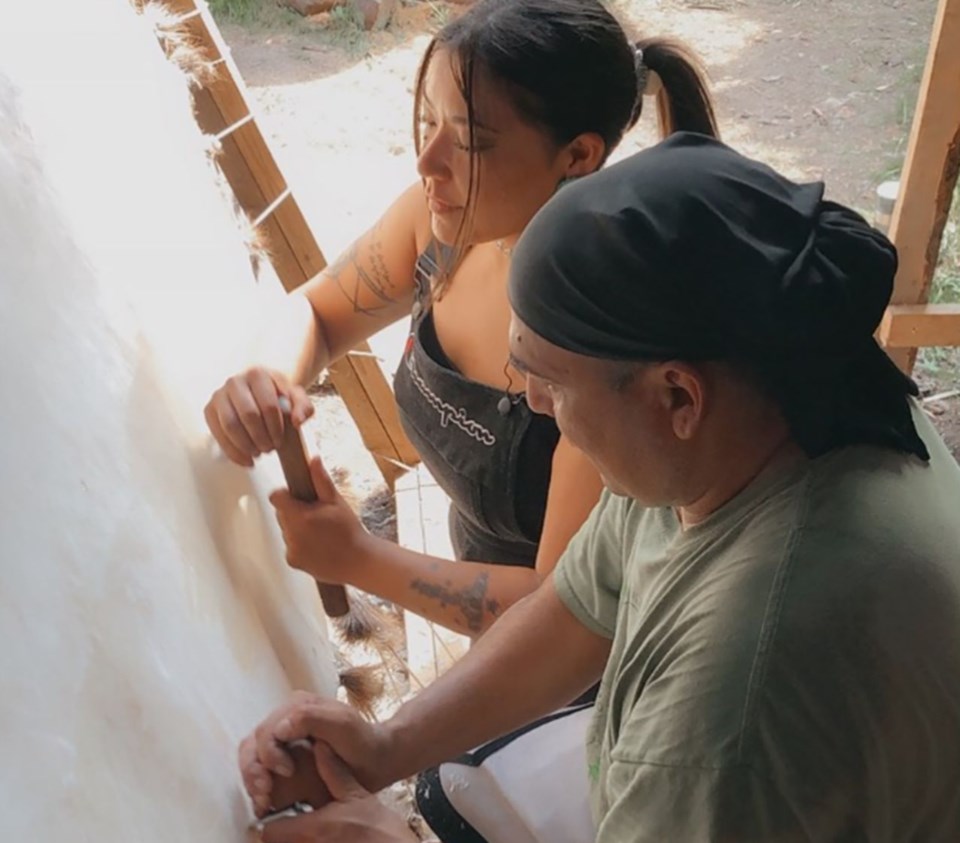VANCOUVER, B.C. – Through her exquisite beadwork and traditional moose hide craftsmanship, Taylor Fehr is working to expand upon the rich heritage of her ancestors.
Fehr is proud to be an indigenous Nehiyaw (Cree) woman from Treaty Six Territory in Saskatchewan.
She is a talented and accomplished creator who specializes in harmonizing the teachings of bead working and the labour-intensive process of tanning moose hide into jewelry and fine wearable artwork. She performs the beautiful tradition of her peoples with great reverence to the land on which she lives as a guest on the unceded territory of the Halq̓eméylem,Skwxwúʔmesh, and Tsleil-Waututh Nations.
“I learned how [to] bead and got mostly inspired by my dad,” says Fehr “He made all his regalia himself when he danced powwow. He tanned his own hides and harvested his own porcupine quills. I never really got into it as a kid but as I got older, I appreciated his work more.”
Fehr is successfully passing on the traditional knowledge of processing and tanning moose hide using traditional methods.
She reflects that, “I’m beyond grateful to be working beside my dad and sharing the knowledge of tanning hides.” During the process of creating a pair of striking moose hide canoes inlaid with glass beadwork, she stated that “moose hide can be very difficult to work with sometimes. If you’re sewing through two layers [of the moose hide] you have to pull out your pliers and that can take up quite a bit of time.”
It was also a difficult process to hand sand the paddles that were a part of a set of earrings she was creating. It’s difficult, she said, “but it’s definitely an accomplishment.”
With her goal of developing her “authentic signature piece” complete, Fehr continues to be a student of the art. The piece resembles the traditional home of her Cree ancestors in the form of a tipi; the designs were ornamented with porcupine quill, the fur from a rabbit and dentalium shell. For the benefit of those unfamiliar, these dentalium shells are from a mollusk that resembles the tusk of an animal. It has been praised and used by First Nations and Inuit peoples in art for its distinct beauty and its cultural significance in ceremony.
Fehr is a true supporter of the diverse local community of Indigenous artists in Vancouver. She says, “Being in those spaces where I’m at Indigenous markets around other creative artists gives me a sense of belonging. If I didn’t have beadwork in my life right now I don’t know if I would’ve met so many inspiring people who are Indigenous and make me feel as proud to be Indigenous.”
She has experience as a vendor selling pieces through markets and powwows in the Greater Vancouver Area, such as earlier in the year at the Mothers Day Traditional “Strength is in our Braids” powwow where the Northern Cree were the host drum group. By using her Instagram page, she can promote Indigenous events throughout the city.
Fehr curates a social media account to connect with her clients and organise with fellow creators. Currently, she is in the process of setting up an Indigenous Market of her own. She is launching the market with the kind collaboration of the Bladerunners organization – a community-based program that operates in the Lower Mainland, British Columbia.
The Bladerunnners program bridges the gap for the urban Native community. They provide useful job training and job placement, counselling support, and life skills for wellbeing to cater specifically to Aboriginal youth and young adults in the heart of downtown Vancouver. They are using this opportunity to have Indigenous small business owners come together to generously share their creations.
This development will provide a safe space to share Indigeneity with the entire community of the Greater Vancouver Area.
“It’s important to me to do this kind of work and have representation of our arts and culture in my beadwork as an urban Indigenous artist because I want to be able to pass down everything I’ve learned on to the next generation,” states Taylor. “I’ve taught many friends and family how to bead and seeing them make their own pieces and grow into their own artwork is really rewarding and heartwarming.”
You can find more of Taylor’s art and information regarding further pop-up Indigenous markets on her business Instagram page, taylorthecreator333




